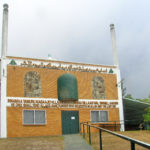Man Bashes Heavily Pregnant Muslim Woman

Many of us have now seen the horrific footage of a Sydney man assaulting a heavily pregnant woman in a Parramatta café.
The man, Stipe Lozina, allegedly punched Ms Rana Elasmar repeatedly in an unprovoked attack – then stomped on her head after she fell to the floor. He has been charged with assault occasioning actual bodily harm and affray, and was refused bail in Parramatta Local Court.
Police are currently investigating whether the attack against the Muslim woman, who was wearing a hijab, was racially motivated.
They say they are in the process of interviewing witnesses and reviewing the security camera footage, which shows Mr Lozina leaning over the table where the complainant was sitting with friends.
It is alleged the man made derogatory comments about Muslims before punching the woman more than a dozen times in the face, before stomping on her when she was down.
The woman’s shocked friends and a number of bystanders eventually pulled the man away, but not before the assailant had inflicted injuries to her head and body.
Racially motivated attacks are on the rise
Islamophobia is alive and well in Australia, and recent analysis of hate crimes shows that Muslim women and girls are the most common targets reported over a two-year period, with abuse starting from as early as preschool.
A report by researchers at Charles Sturt University found Islamophobia in Australia was “a continuous phenomenon” and women wearing a headscarf are especially at risk.
Of 113 female victims who reported being physically intimidated or harassed, researchers found 96 percent were wearing a headscarf.
The 2019 Islamophobia in Australia report also found that almost 350 attacks occurred across the nation in 2016 and 2017 and of those, 60 per cent occurred in public, a figure double the proportion of recorded incidents in the previous 15 months.
Further figures show that 72 percent of targets are women and the perpetrators are most often men – in 73 percent of cases.
Very few people are prosecuted for hate crimes
But many victims believe that these statistics only show part of the story because we don’t track and analyse the numbers properly. Many hate crimes go unreported, a fact compounded by the issue they are very rarely prosecuted in Australia.
Figures show that only 21 people have ever been convicted of a hate crime – and none of them in New South Wales since laws were introduced in 1994.
This is also despite the fact that in the wake of the Cronulla riots in December 2005, in an attempt to prevent hate crimes as well as monitor any low-level racially motivated activity that could escalate into more serious violence, the New South Wales Police set up a secret department called the Bias Motivated Crimes Unit.
The Unit is however, vastly under-funded and under-resourced. It’s been reported that the unit had its staff reduced from four officers to one earlier this year. However, NSW police say that the unit is supported by the Counter Terrorism and Special Tactics Command intelligence unit — and every officer had training and understanding of bias crime.
Other charges are sometimes easier to prove
A leading New South Wales criminologist says often the reason people are not charged or prosecuted for hate crimes even when prejudice is flagged as a factor, is that police and prosecutors often prefer to pursue charges that are easier to prove in court.
Offences like stalking and wilful damage do not require prosecutors to prove the motivation of the perpetrator and result in greater penalties.
Mr Lozina has been charged with ‘assault occasioning actual bodily harm’ – or AOABH -which is an offence that is laid when the victim has sustained an injury that is more than ‘transient or trifling’; such as lasting bruises, cuts and abrasions. Serious injury can also amount to AOABH.
The maximum penalty for an AOABH is five years in prison if the matter is dealt with in the district court, or two years if it remains in the local court.
Mr Lozina has also been charged with ‘affray’, which carries a maximum penalty of 10 years in prison in the district court, or two years in the local court. An affray is where a person uses or threatens unlawful violence towards another and whose conduct is such as would cause a person of reasonable firmness present at the scene to fear for his or her personal safety.
Mr Lozina has a previous criminal record and is known to police. He will remain in custody until his next court appearance, scheduled for 5 December 2019.








